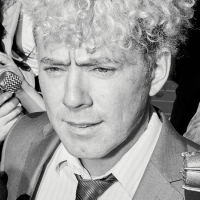 Premiere: Sydney grunge newcomers Death Castle unveil their first single, Crash LandingDeath Castle is a newly-minted project from Bill Johnston and Rollo Anderson, favourites with years worth of experience across Sydney acts.
Premiere: Sydney grunge newcomers Death Castle unveil their first single, Crash LandingDeath Castle is a newly-minted project from Bill Johnston and Rollo Anderson, favourites with years worth of experience across Sydney acts.

Spacey Jane, and the meaningful magic of Booster Seat one year on
The Perth breakthroughs will perform at SOTA Festival next week, just a few days shy of the one-year anniversary for their debut album, Sunlight.
Article written by Nathan Hugh Robért. Header image by Charlie Hardy.
I stood on the top balcony of the amphitheatre, watching the audience below swell under the high ceiling. It was one of Spacey Jane’s last shows on an extensive tour around the state, and the band have solidified themselves as one the most promising live acts to come out of Australia. Tonight, the four-piece were reminding everyone why. It was as if the venue was a church, the band its preachers, and the audience its loyal congregation.
I have watched Spacey Jane from their inception. I was one of the lucky few who attended their first gig in lead singer Caleb Harper’s back garden. It was 2016, and the Perth music scene was flooded with bands following in Tame Impala’s psychedelic footsteps. Spacey Jane brought something different to the table. Tracks like Feeding the Family and Still Running disregard psychedelic sensibilities and pay homage to a cleaner, harder rock sound. From the start, their bright and energetic guitar work - coupled with passion-filled lyrics - enticed crowds to lean into the live music experience. Now, five years later, the band has far surpassed playing for their friends in a backyard, but their energy is still the same. Tonight, the crowd is enthralled by the now-familiar guitars riffs. I stand and watch as a hoard of young bodies dance, singing along unashamedly to lyrics that seem to be itched into their hearts.
On the 7th of May 2021, the band’s now most-renowned song, Booster Seat went platinum. Sonically, Booster Seat is reminiscent of the worship songs Evangelical church-goers would be all too familiar with. Harper, the principal songwriter, grew up Christian, and this charismatic style of music punctuated his formative years. Beyond the politics of religion, this genre of worship - often associated with the likes of Hillsong - is written to be cathartic. The grandeur of the songs induces a sense of abandon – the listener drops their worldly worries and opens themselves up to a higher power. Engulfed by the climatic choruses and sensitive verses, the worshiper feels relief as their life stresses momentarily melt away.
Booster Seat is no different. As the chorus swells into its crescendo, the song invites you to let go of - or even work through - all that pulls you down. This cathartic effect is not limited to Booster Seat; most of the tracks of the band’s debut album Sunlight, have the same emotive punch. Harper’s voice - which soars to the higher octaves with an almost rasping tone - provides the perfect vehicle for lyrics about depression and anxiety. Songs like Head Cold, Straightfaced and Trucks paint a vivid picture of someone who is grappling with mental turmoil, and the destructive impact it has on their life. If the assertion that “all art is screaming” is true, then the album Sunlight is a sustained scream truncated into twelve tracks.
Audiences have eagerly embraced Spacey Jane’s music - Sunlight debuted at #2 on the ARIA charts and Booster Seat placed second in triple j’s Hottest 100 this year - and the anxiety-filled songs have struck a chord with young listeners. Triple J’s Al Newstead claims that Booster Seat is not the kind of song to “blow up”, as it lacks the high energy of Australian songs that have previously ranked at the top of the Hottest 100. He goes on to suggest that the heart-filled song resonated with audiences in a year marked by lockdowns and a lack of parties, and this suggestion might hold some truth, there are further complexities at play; complexities of the situation that younger generations face, and potentially, why the song is resonating with this generation so much.
2020 put salt in the wounds of social issues that had been open for quite some time. In the past few decades, Australia has seen: wealth inequality increase, wages stagnate for the average earner and housing has only become less affordable. For those between the ages of 18 – 30, the chances of achieving the standard of living our parents enjoy are becoming increasingly unattainable. The COVID-induced economic slowdown means that Australia, and many other countries, are at risk of a recession, and if it doesn't work that way, there's a fear in the economy present that hasn't existed in over a decade. Even the age-old mantra of “hard work pays off” seems redundant in the face of research showing that for every one job available for young Australians, there are eight us looking for work.
The hope of achieving the Australian dream – home ownership and financial security – is now accompanied by pervasive uncertainty; and with that uncertainty comes growing anxiety about the future. Even if the economy were to rectify itself, it would not prevent the impending ecological crisis. The very fact that our economy is grounded in a model of exponential growth means that our limited natural resources are being exhausted, and the planet's existing ecosystems are being pushed to the brink of collapse. Before COVID-19, the average Australian was consuming almost five times more than the average person in India, and we would need about 5.3 times more of the earth’s resources to sustain our lifestyle. A return to a ‘normal’ level of production, consumption and exchange would signal a collective charge towards an ecological meltdown.
Parallel to this economic and ecological unravelling, the mental health of younger generations has been deteriorating to such an extent, that many argue the situation has now reached the point of crisis. In a recent survey of 30,000 people, younger generations ranked the lowest in psychological wellbeing. Since the outbreak of COVID-19, suicide prevention service Lifeline has seen the number of crisis calls they receive jump to an astounding average of 3100 per day. Figures like these have led psychotherapist Arkadius Kyllendahl, quoted in The New York Times, to state “We are in the midst of a mental health pandemic, and I don’t think it’s treated with near enough respect.”
As bleak as the situation is, something can, and has to be done. The problem is: almost no one in a position of power is taking full responsibility for the situation. Australia’s “gas-led economic recovery plan” will only further damage the environment, and it will not create the jobs needed to get us out of recession. Mental illness is the major cause of premature death for Australians under 40, but mental illness support saw the lowest rates of access and quality out of any other healthcare service. Governments, corporations and global bodies doing their best, doesn’t seem to be good enough.
Instead, the responsibility for these mammoth issues is placed at the feet of individuals – keep cups, self-help and entrepreneurship are touted as simple remedies to complex problems. But as the response to COVID-19 has shown, immediate, collective action - that is guided by expert knowledge - is crucial to meaningful solutions. Individuals have their part to play, of course, but without the resources, support and knowledge of governing bodies, individuals can only go so far. Young Australians, and indeed young people around the world, now face a series of existential threats, with little reassurance that those in power are going to take the required action to avoid catastrophe. This predicament produces a sense of pervasive uncertainty, a sense that one lacks the control vital required for the current situation. What is needed is security – the knowledge that the future will be okay.
In an interview on triple j with Richard Kingsmill, Caleb points out that Booster Seat is “a metaphor for having no control”. The song is obviously referring to the trust that marks an intimate relationship; the trust that someone will not hurt you despite the fact they so easily could. In order to feel secure in a relationship you have to trust another, and in the act of giving yourself over in this way, you relinquish all control, and you rely on them to honour the implicit pact that they will keep you from heartbreak that is almost inevitable.
In the same interview, Harper goes on to add that Booster Seat also explores “how you come to rely on someone in a parental sense”. Reliance is an integral part of almost any childhood. In the ideal situation, a child can rely on their parents to care for them; to keep them secure. This idea of care and security is laced through the Booster Seat chorus. As it goes:
"And if it wasn't for that time in the taxi
When you called it out, you said it was anxiety
Well, you held me from the back of the front seat
And you told me all the times that you'd lied to me
Well, I felt like a kid, like I could touch my feet
As they hovered above the ground in my booster seat."
The lies have jeopardised the singer’s sense of security, and the subsequent anxiety is caused by the realisation that they have become fully reliant on someone who could - and has - break their trust. It is the acute realisation that they have no control; they have surrendered to the whims of someone else, and they are like a child at the mercy of a parent’s command. This deeply personal metaphor captures the inescapable feeling that is carried by our generation: we have given control to those we can no longer trust.
We feel helpless in the face of unpredictable circumstances. To be a child cocooned in a loving family is to be strapped in, secure from the outside world. Now, we long for that feeling as the tragedies of the time seem beyond our control. In the current situation, control or uncertainty are the only two options. As we long for the one feeling, we plan our escape from the other. In the face of catastrophe, there is little time for escape, only refuge.
Spacey Jane provides refuge in the form of sonic catharsis; as their immense sound batters off the walls of a venue, the listeners lose themselves. If Spacey Jane were a religion, their gospel would be simple: I feel anxious too. Like believers gather on a Sunday, listeners flock to their shows, ready to worship, captured by songs that speak to their anxiety, and momentarily, release them from it.
Spacey Jane are performing at this year's SOTA Rewired, more details and full line-up here. Pre-order the Deluxe Edition of their debut album Sunlight here.
 Premiere: Sydney grunge newcomers Death Castle unveil their first single, Crash LandingDeath Castle is a newly-minted project from Bill Johnston and Rollo Anderson, favourites with years worth of experience across Sydney acts.
Premiere: Sydney grunge newcomers Death Castle unveil their first single, Crash LandingDeath Castle is a newly-minted project from Bill Johnston and Rollo Anderson, favourites with years worth of experience across Sydney acts.
 Premiere: Shiny Joe Ryan returns with new song Ketamine, new album out in JulyThe POND multi-instrumentalist's new album, Shiny's Democracy, will be his first in seven years when it arrives on July 23rd.
Premiere: Shiny Joe Ryan returns with new song Ketamine, new album out in JulyThe POND multi-instrumentalist's new album, Shiny's Democracy, will be his first in seven years when it arrives on July 23rd.